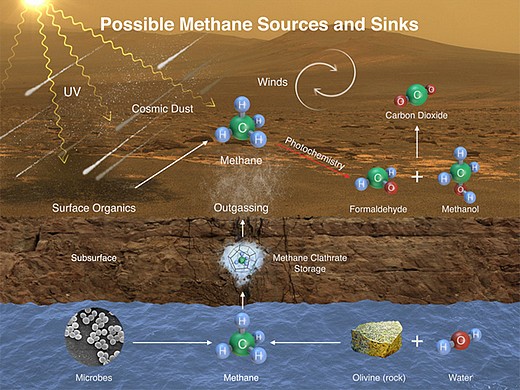It looks like you're using an Ad Blocker.
Please white-list or disable AboveTopSecret.com in your ad-blocking tool.
Thank you.
Some features of ATS will be disabled while you continue to use an ad-blocker.
share:
A new paper published today in Science reveals that measurements taken
with Curiosity's tunable laser spectrometer (TLS) over a 20-month period show episodically fluctuating levels of methane in the Gale Crater,
indicating a source of methane not accounted for in the predictive models.
 Gale Crater. Image Credit: NASA JPL/CalTech,
source
Gale Crater. Image Credit: NASA JPL/CalTech,
source
From Washington Post:

From Washington Post:
Readings from the rover found methane levels to be around half of what scientists had expected, based on all the natural processes that should be creating methane on the surface.
But periodically during their 20 month observation, the NASA scientists saw methane levels spike by an order of 10 -- sometimes in as little as 60 Martian days (just over two months on Earth).
That probably means that it's being vented out somewhere near the crater, then quickly dispersing. It's likely that some process beneath the surface -- whether it's biological or geological -- occasionally floods the Gale Crater with methane by burping it out. Then the winds of Mars scatters the gas, and UV radiation destroys much of the methane.
edit on 2014-12-16 by theantediluvian because: corrected: abstract
indicates spikes are episodic not periodic
a reply to: theantediluvian
Important findings, indeed ... especially because it verifies previously gathered orbital data that always indicated higher levels of methane in the martian atmosphere.
Here goes yet another link with a somewhat comprehensive summary:
Methane 'belches' detected on Mars
So what's the reason for these occasional high levels of methane? Underground reserves? Present (microbial) life? Remnants of past activity released through fissures? Geochemistry? Difficult to say, but I'm definitely looking forward to what others on here have to say!
Important findings, indeed ... especially because it verifies previously gathered orbital data that always indicated higher levels of methane in the martian atmosphere.
Here goes yet another link with a somewhat comprehensive summary:
Methane 'belches' detected on Mars
So what's the reason for these occasional high levels of methane? Underground reserves? Present (microbial) life? Remnants of past activity released through fissures? Geochemistry? Difficult to say, but I'm definitely looking forward to what others on here have to say!
Sorry to use Wikipedia as a reference source here but I think for the purposes of the information it works.
Methanogens
It has often been discussed that life on Mars would be in the form of extremophiles... of which the methanogen is. Plus it can live in solid rock according to the Wiki source.
Interesting but by no means an answer!
Methanogens
It has often been discussed that life on Mars would be in the form of extremophiles... of which the methanogen is. Plus it can live in solid rock according to the Wiki source.
Interesting but by no means an answer!
a reply to: theantediluvian
Was just reading about this here: www.telegraph.co.uk...
Was just reading about this here: www.telegraph.co.uk...
edit on 16-12-2014 by fatpastyhead because: (no reason given)
a reply to: theantediluvian
Thanks for this exciting news. This has further strengthened my belief that there's Martian life forms underground.
Thanks for this exciting news. This has further strengthened my belief that there's Martian life forms underground.
originally posted by: lostbook
a reply to: theantediluvian
Thanks for this exciting news. This has further strengthened my belief that there's Martian life forms underground.
I think it may have "formed" above ground in Mars' wetter, warmer past (when Mars had oceans and a thick atmosphere), finding its way to all parts and depths of the planet, just as life on Earth has found its way to all niches.
However, as the planet lost most of its atmosphere and surface water, only the underground life may have continued to survive -- where it may still survive today.
originally posted by: lostbook
a reply to: theantediluvian
Thanks for this exciting news. This has further strengthened my belief that there's Martian life forms underground.
Lostbook --
I was just re-reading your post, and I realize I misread it. For some reason I thought you said your belief is that life on mars "formed" underground, hence my post above.
Sorry for the misinterpretation!
Having said that -- I agree with you (at least I believe the potential for underground life is certainly there).
edit on 12/16/2014 by Soylent Green Is People because: (no reason given)
Pretty indicative of life... but not definitive. But it does add to the likelihood ...with the two (or is it three now?) meteorites from Mars with
very possible fossils, the Viking test being positive for life according to the guy who designed it, etc.
Perhaps Mars, itself, is alive... and gassy.
Perhaps Mars, itself, is alive... and gassy.
edit on 12/16/2014 by Baddogma because: typo
a reply to: jeep3r
Even if the methane isn't coming from a biological source, some other plausible alternatives such as serpentinisation or iron oxidation could point to the presence of liquid water beneath the surface, possibly in aquifers.
It's got me thinking about methane bubbles forming underwater which (not to sidetrack my own thread) brings to mind the frozen methane bubbles in Abraham Lake:

(any excuse for a cool picture )
Even if the methane isn't coming from a biological source, some other plausible alternatives such as serpentinisation or iron oxidation could point to the presence of liquid water beneath the surface, possibly in aquifers.
It's got me thinking about methane bubbles forming underwater which (not to sidetrack my own thread) brings to mind the frozen methane bubbles in Abraham Lake:

(any excuse for a cool picture )
This adds some background:
www.bloomberg.com - Mars Has Too Little Methane to Support Life, Study Finds ...
This gives some idea of potential sources:
www.dailymail.co.uk - Do we finally have proof of life on Mars? Unexplained methane 'burps' suggest bacteria is living on the red planet...
www.bloomberg.com - Mars Has Too Little Methane to Support Life, Study Finds ...
This gives some idea of potential sources:
www.dailymail.co.uk - Do we finally have proof of life on Mars? Unexplained methane 'burps' suggest bacteria is living on the red planet...
...
The low background level of methane detected by Curiosity can be explained by the sun's rays degrading organic material possibly deposited by meteors, said the Nasa scientists.
But the spikes of methane required an additional source, which was unlikely to be a recent impact by comet or asteroid.
Such an object would have had to measure several metres across and would have left a large crater - no sign of which was visible.
The short time-scale of the methane spikes did not suggest that the gas was released from volcanic deposits trapped in ice, called clathrates either. Nor did it appear to come from the release of gaseous methane that had become bound to the soil.
The Nasa authors are cautious about jumping to conclusions, but conclude that 'methanogenesis' - the formation of methane by microbial bugs known as methanogens - may be one answer to the riddle.
...
edit on 17-12-2014 by jonnywhite because: (no reason given)
a reply to: theantediluvian
Cool pic, indeed! Meanwhile, NASA/JPL managed to summarize the possible causes in a kind of infographic:
 Large Version
Large Version
The above image is part of the recent press release. Obviously, the involved scientists are not yet excluding a microbial cause for the measured methane ... so let's keep our fingers crossed!
Cool pic, indeed! Meanwhile, NASA/JPL managed to summarize the possible causes in a kind of infographic:

The above image is part of the recent press release. Obviously, the involved scientists are not yet excluding a microbial cause for the measured methane ... so let's keep our fingers crossed!
edit on 17-12-2014 by jeep3r because: spelling
originally posted by: lostbook
a reply to: theantediluvian
Thanks for this exciting news. This has further strengthened my belief that there's Martian life forms underground.
There is more exotic life on earth, why do microorganisms on Mars make you happy?
Sure, its life. if the reason.
but not the extinct civilizations people have fantasized about all this time...
Every planet has a potential to support life, in some form.. extremophiles give us that reasoning. But not necessarily evolved and intelligent life, which is what the whole fracas is about. more.. well bugs, who have been bugs for billions of years.
originally posted by: sn0rch
There is more exotic life on earth, why do microorganisms on Mars make you happy?
Because if there is life on Mars (any life at all), and if that life could be shown to have its own genesis (i.e., not seeded from Earth or vice versa), then that may speak volumes about the ubiquity of life in the universe.
That is, if life had two separate and independent beginnings on two planets next door to each other, then that suggests that the genesis of life elsewhere is an extremely common thing.
It's one thing to say that there must be life elsewhere in the universe because the universe is so big. However, if we then introduce the idea that not only is the universe so big, but it also seems the genesis of life may be a very common thing, then that really changes the landscape of how we look at the potential for other places to have life.
edit on 12/17/2014 by Soylent Green Is People because: (no reason given)
I am still in the camp of thoughts that there WAS life on Mars and there still possibly IS life on Mars, though I am thinking the current life is
possibly microbial. I think the past life on Mars, was possibly humanoid. I have been reading comments from a Dr. John Brandenburg Ph.D who has been
studying the Cydonia plain area including the famous Mars face, and he has concluded there was no reason to think they were artifical. He has a
background in atomic weapons research and he is thinking isotopes in the Martian soil and atmosphere suggest that a huge nuclear explosion one which
was capable of wrecking the entire planet took place in the northern hemisphere of Mars millions of years ago. I find this fascinating, and am open
minded of all the possibilities for this type of thinking.
The question-- is Mars' methane due to living things, or merely geology? May be answerable. Methane produced by life should have much more carbon 12
relative to carbon 13 than if it came from the decomposition of minerals. A mass spectrometer is needed to check these isotope ratios.
Fortunately, the Curiosity rover has such an instrument. The detection of methane we are now hearing about was done with a different instrument, so the question must remain unanswered for the moment.
At only 7 parts per billion, let us hope there is enough methane for the mass spectrometer to work with, so that it can be used to tell us if there is life on Mars.
Fortunately, the Curiosity rover has such an instrument. The detection of methane we are now hearing about was done with a different instrument, so the question must remain unanswered for the moment.
At only 7 parts per billion, let us hope there is enough methane for the mass spectrometer to work with, so that it can be used to tell us if there is life on Mars.
The next rover being sent to Mars, Mars 2020 will likely seek an answer to the question of where the methane is coming from if we do not figure it out
from data Curiosity has collected/is collecting.
edit on 17-12-2014 by JadeStar because: (no reason given)
Well, if no one else is living there then it seems like a good reason to start terra forming.
Let's Americanize Mars! The Red White and Blue planet part duex. We shall rule the galaxy!
Suck it Russia!
We can not, of course, move Mars to a warmer orbit. However we do know another way to heat a planet, through an artificially induced greenhouse effect that traps the Sun's heat within the atmosphere. Such an atmospheric greenhouse could be created on Mars in at least three different ways. One way would be to set up factories on Mars to produce very powerful artificial greenhouse gasses such as halocarbons ("CFC's") and release them into the atmosphere. Another way would be to use orbital mirrors or other large scale power sources to warm selected areas of the planet, such as the south polar cap, to release large reservoirs of the native greenhouse gas, CO2, which may be trapped their in frozen or adsorbed form. Finally natural greenhouse gases more powerful than CO2 (but much less so than halocarbons) such as ammonia or methane could be imported to Mars in large quantities if asteroidal objects rich with such volatiles in frozen form should prove to exist in the outer solar system.
Each of these methods of planetary warming would be enhanced by large amounts of CO2 from polar cap and the soil that would be released as a result of the induced temperature rise. This CO2 would add massively to the greenhouse effect being created directly, speeding and multiplying the warming process.
The Mars atmosphere/regolith greenhouse effect system is thus one with a built-in positive feedback. The warmer it gets, the thicker the atmosphere becomes; and the thicker the atmosphere becomes the warmer it gets. A method of modeling this system and the results of calculations based upon it are given in the sections below.
Let's Americanize Mars! The Red White and Blue planet part duex. We shall rule the galaxy!
Suck it Russia!
edit on 17-12-2014 by Thorneblood because: (no reason given)
originally posted by: JadeStar
The next rover being sent to Mars, Mars 2020 will likely seek an answer to the question of where the methane is coming from if we do not figure it out from data Curiosity has collected/is collecting.
Further inquiry reveals that Curiosity's mass spectrometer can not do isotope analysis at methane levels below tens of parts per billion. So, unless a much larger burst of methane comes along, it looks as if the Mars 2020 mission is the best hope for resolving the source of the methane.
Whatever the situation on Mars is today with respect to life, I would have loved to be able to see the planet a long time ago when it apparently had a
thicker atmosphere, and liquid water on the surface. I bet it would have been beautiful.
a reply to: theantediluvian
Sorry there is methane is not on mars...it comes from Uranus.
Sorry there is methane is not on mars...it comes from Uranus.
edit on 19-12-2014 by nighthawk1954 because: (no reason given)
new topics
-
God's Righteousness is Greater than Our Wrath
Religion, Faith, And Theology: 41 minutes ago -
Electrical tricks for saving money
Education and Media: 3 hours ago -
VP's Secret Service agent brawls with other agents at Andrews
Mainstream News: 5 hours ago -
Sunak spinning the sickness figures
Other Current Events: 5 hours ago -
Nearly 70% Of Americans Want Talks To End War In Ukraine
Political Issues: 5 hours ago -
Late Night with the Devil - a really good unusual modern horror film.
Movies: 7 hours ago -
Cats Used as Live Bait to Train Ferocious Pitbulls in Illegal NYC Dogfighting
Social Issues and Civil Unrest: 9 hours ago -
The Good News According to Jesus - Episode 1
Religion, Faith, And Theology: 11 hours ago
top topics
-
Florida man's trip overseas ends in shock over $143,000 T-Mobile phone bill
Social Issues and Civil Unrest: 16 hours ago, 8 flags -
Cats Used as Live Bait to Train Ferocious Pitbulls in Illegal NYC Dogfighting
Social Issues and Civil Unrest: 9 hours ago, 8 flags -
VP's Secret Service agent brawls with other agents at Andrews
Mainstream News: 5 hours ago, 8 flags -
Bobiverse
Fantasy & Science Fiction: 16 hours ago, 3 flags -
HORRIBLE !! Russian Soldier Drinking Own Urine To Survive In Battle
World War Three: 13 hours ago, 3 flags -
Electrical tricks for saving money
Education and Media: 3 hours ago, 3 flags -
Nearly 70% Of Americans Want Talks To End War In Ukraine
Political Issues: 5 hours ago, 3 flags -
Sunak spinning the sickness figures
Other Current Events: 5 hours ago, 3 flags -
Late Night with the Devil - a really good unusual modern horror film.
Movies: 7 hours ago, 2 flags -
The Good News According to Jesus - Episode 1
Religion, Faith, And Theology: 11 hours ago, 1 flags
active topics
-
VP's Secret Service agent brawls with other agents at Andrews
Mainstream News • 34 • : WeMustCare -
New whistleblower Jason Sands speaks on Twitter Spaces last night.
Aliens and UFOs • 53 • : pianopraze -
Sunak spinning the sickness figures
Other Current Events • 5 • : glen200376 -
SETI chief says US has no evidence for alien technology. 'And we never have'
Aliens and UFOs • 44 • : MikeDeGrasseTyson -
HORRIBLE !! Russian Soldier Drinking Own Urine To Survive In Battle
World War Three • 31 • : budzprime69 -
How ageing is" immune deficiency"
Medical Issues & Conspiracies • 33 • : rickymouse -
The Reality of the Laser
Military Projects • 46 • : Zaphod58 -
God's Righteousness is Greater than Our Wrath
Religion, Faith, And Theology • 0 • : randomuser2034 -
President BIDEN Vows to Make Americans Pay More Federal Taxes in 2025 - Political Suicide.
2024 Elections • 136 • : ImagoDei -
Electrical tricks for saving money
Education and Media • 3 • : Mike72
